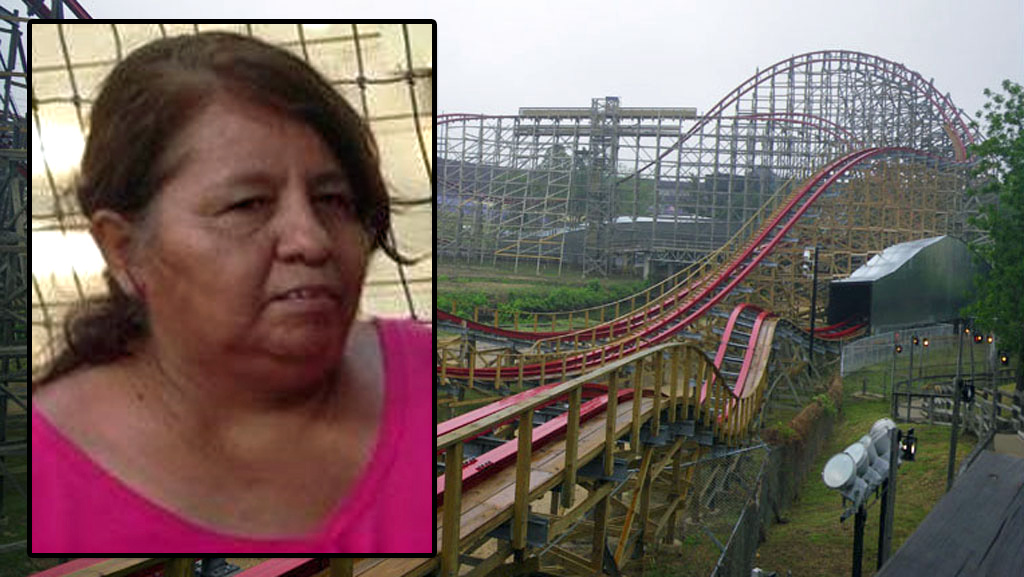The family of the 52-year-old woman who died when she was ejected from the Texas Giant roller coaster at Six Flags Over Texas in July filed a lawsuit against Six Flags Tuesday in a Tarrant County district court.
Rosa Esparza died on July 19 after she was ejected from the ride and fell 75 feet. She struck a metal support beam before coming to rest on the roof of the tunnel where the ride departs, according to the medical examiner's report.
In a statement released Tuesday evening, Six Flags said the Texas Giant will reopen this weekend after adding 'incremental and overlapping safety measures for the ride that include re-designed restraint-bar pads from the manufacturer and new seat belts.'
The theme park will also provide a coaster seat at the entrance of the ride so guests 'with unique body shapes or sizes' can test their fit before getting in line.
Six Flags said the coaster got a green light to resume operations from the Texas Department of Insurance after extensive testing.
'That means the coaster is working properly,' said amusement ride safety expert Ken Martin. 'There were no issues dealing with the mechanical moving parts; this was more of I interpret that to mean more of a human behavior type of issue.'
In the news release announcing the reopening of the Texas Giant, Six Flags Over Texas park president Steve Martindale recognized the Esparza family's loss.
'We are heartbroken and will forever feel the pain and sadness of this tragic accident. Our sincerest condolences go out to the family and friends of Ms. Esparza,' Martindale said. 'The safety of our guests and employees is our company's absolute highest priority and we try to take every reasonable precaution to eliminate the risk of accidents.'
Martin said someone made a mistake in letting Rosa Esparza board the Texas Giant.
'From what I'm hearing and seeing and learning from this particular incident, had I been a ride operator, I probably would have excluded her from riding that coaster,' he said.
The Esparza family's lawsuit, which accuses Six Flags of negligence, alleges that Six Flags has been reactive, not proactive in regard to safety systems and that caused Esparza's death.
The family's suit said after the mother's death, inspections showed that various parts of the security systems on the ride were experiencing inconsistencies and intermittent failures. It alleges that Six Flags admitted after the inspections 'they replaced a 'limit switch' for a restraint in a seat in the very car in which Rosa [Esparza] was riding because Six Flags found the switch to be defective.'
'Six Flags has known for decades the real risks and extreme dangers posed by roller coasters and other amusement rides,' the suit summary said. 'Yet, instead of making their rides safer, Six Flags continually pushes the envelope, building extreme roller coasters that are bigger, faster, and more dangerous.'
The Esparza family attorneys have requested a jury trial and are seeking compensation greater than $1 million.
The suit was filed by six family members against Six Flags Entertainment Corporation and Six Flags Theme Parks, Inc., both based in Delaware, and Texas Flags, Ltd. and Six Flags Over Texas, Inc. both based in Texas.
Six Flags' Martindale said that he, his family and staff will be among the first riders on the Texas Giant when it reopens.
The lawsuit requests depositions from the person with the most knowledge of maintenance done on the Texas Giant, the expert regarding the roller coaster's design, the expert regarding the safety features on the ride that would keep a rider from being ejected, the expert regarding operating procedures on the ride, all employees who were on duty when the incident occurred, the expert regarding the redesign of the Texas Giant in 2010 and 2011, the experts regarding the testing and changes made on the ride following the incident, and an expert regarding other incidents involving injuries and deaths on theme park rides.
The lawsuit summary claims that Six Flags knew as early as 1978 that in the absence of a seat belt passengers had greater risk of being ejected from a roller coaster, as multiple passengers 'had fallen to their deaths while riding Six Flags' roller coasters, only to have Six Flags add safety belts after it was too late.'
'Rose Esparza apparently met all of Six Flags' requirements to ride the roller-coaster because no Six Flags employee prevented her from riding the roller coaster,' the lawsuit says. 'The roller-coaster had one safety bar restraint for each seat, but had no lap seat belts and no shoulder harness seat belts.'
Additionally, the suit describes a set of green lights that are supposed to light when each safety bar is in the proper position, which was 'confusing and dangerous because it had a tendency to create a false sense of security and complacency on the part of the operators of the ride.' The suit goes on to claim that, during inspections after the incident, the relative locking positions of the safety bars were inconsistent and there were intermittent failures in the green light system.
E-mail mdiaz@wfaa.com


